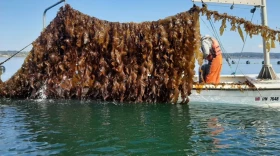-
On a gray, early spring morning, I drove to Steilacoom, Washington, to catch the ferry to Anderson Island. I boarded alongside the line of other cars and after parking, stepped out onto the deck of the boat. The ferry pushed off from the dock and rocked a little in the Puget Sound before steadying. I took this journey to the real Anderson Island to see from the water what inspired Northwest author Kirsten Sundberg Lunstrum’s new novel, “Elita,” which was published earlier this year. Sundberg Lunstrum was inspired while sailing around the Puget Sound to write a mystery novel on an island. Sundberg Lunstrum read excerpts of the book at a gathering at Tacoma’s Grit City Books.
-
It used to be the case that people who harvest shellfish could breathe a sigh of relief in late autumn. Spring, summer and even early fall have long presented the right conditions for harmful algae to grow and produce biotoxins in waters along the Washington state coast and into Puget Sound.But in recent years, recreational and commercial harvesters, state agencies and tribes are noticing biotoxin outbreaks more commonly in the winter, too.
-
(Runtime 4:01)In the spring, the South Sound lost an airwaves icon. John Mangan ran the top 40 station I-91, bringing music to thousands of listeners, and…
-
After about five years in the works, the Pierce County Council adopted a new Comprehensive Flood Hazard Management Plan that broadens the scope of what kinds of flooding the county will plan for – from coastal to urban flooding. Angela Angove is the floodplain and watershed services manager with Pierce County Planning and Public Works. She said different types of flooding are top of mind for people in the county, recalling the King Tides that caused tidal flooding last December.
-
(Runtime 0:57)A once-rare flowering prairie plant has recovered enough in Washington and Oregon for federal officials to remove it from the Endangered…
-
Prospective kelp growers who want to join the handful of existing commercial seaweed farms in the Pacific Northwest are having to contend with a lengthy permitting process. It's gotten contentious in a few cases, but even so, at least a couple of new seaweed farms stand on the cusp of approval. Their harvests could be sold for human food, animal feed or fertilizer.
-
The majority of captains of big commercial ships entering and leaving Puget Sound are cooperating with a request to slow down temporarily to reduce underwater noise impacts to the Pacific Northwest's critically endangered killer whales. The duration of the experimental slowdown – modeled on a similar project in British Columbia – will be extended into the new year, organizers announced after a status report and celebration on the Seattle waterfront Friday.
-
Fortunately, it doesn't happen very often in the Pacific Northwest that ships collide with whales. But when it does, it's upsetting, tragic and the whale probably dies. Three separate teams have developed smartphone-based systems that can alert commercial mariners to watch out, slow down or change course when whales have been sighted nearby. A recent ride-along on a big container ship demonstrated that real-time whale alerts are still a work in progress.
-
There's a rising tide of interest in opening seaweed farms in the Pacific Northwest. If even half of the current applicants succeed, it would more than double the small number of commercial seaweed growing operations in Oregon and Washington state.
-
Speed boats, tugboats, cruise ships and any other watercraft operating in Puget Sound will soon have to comply with a new federal No Discharge Zone.
Play Live Radio
Next Up:
0:00
0:00
Available On Air Stations










